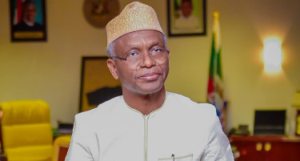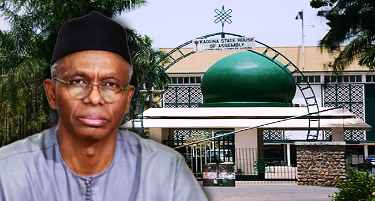Former Governor of Kaduna State, Nasir El-Rufai, has escalated his concerns about alleged judicial bias to the Chief Judge of the Federal High Court, seeking the reassignment of his case currently overseen by Justice R.M Aikawa. El-Rufai’s petition, submitted in June 2024, calls for the transfer of his case to another judge to ensure impartiality and fairness.
El-Rufai is contesting the findings of a probe conducted by the Kaduna State House of Assembly, which indicted him for the alleged misappropriation of ₦423 billion in public funds during his tenure as governor. His lawsuit aims to nullify the Assembly’s report, asserting that it violated his constitutional right to a fair hearing.
The former governor’s legal battle intensified when Justice Aikawa, presiding over the Federal High Court in Kaduna, decided to proceed with a hearing in El-Rufai’s absence. The hearing, which took place on a Thursday, involved the respondents presenting their preliminary and substantive objections. Notably, El-Rufai’s counsel, Abdulhakeem Mustapha, was not present during this session.
Justice Aikawa subsequently adjourned the ruling on the case, a decision that prompted El-Rufai to take immediate action. In his petition to the Chief Judge, El-Rufai expressed his dissatisfaction with the judge’s decision to proceed in his absence, citing it as a clear indication of bias and a violation of his right to a fair hearing.
 El-Rufai’s petition underscores his demand for the reassignment of his case to a different judge, arguing that Justice Aikawa’s actions compromised the principles of justice and fairness. The former governor emphasized that proceeding with the hearing without the presence of his legal representative was tantamount to an extreme bias, leading to an unjust process that denied him a fair opportunity to defend himself.
El-Rufai’s petition underscores his demand for the reassignment of his case to a different judge, arguing that Justice Aikawa’s actions compromised the principles of justice and fairness. The former governor emphasized that proceeding with the hearing without the presence of his legal representative was tantamount to an extreme bias, leading to an unjust process that denied him a fair opportunity to defend himself.
The controversy surrounding this case has significant implications for the political and legal landscape in Kaduna State. El-Rufai’s indictment by the State Assembly has already stirred considerable attention, and his subsequent legal maneuvers highlight the complexities of navigating political accountability and judicial processes.
In his fundamental rights case, El-Rufai is challenging the Assembly’s report on the grounds that it infringed upon his constitutionally guaranteed right to a fair hearing. He contends that the procedural shortcomings and the manner in which the report was compiled rendered it legally untenable. El-Rufai’s legal team argues that the Assembly’s actions were driven by political motives and lacked the due process required for such serious allegations.
The former governor’s request for a case reassignment is rooted in his belief that Justice Aikawa’s handling of the proceedings thus far has demonstrated a lack of impartiality. By seeking the intervention of the Chief Judge, El-Rufai aims to ensure that his case is heard by a judge who can objectively and fairly assess the merits of his arguments without preconceived biases.
As this legal saga unfolds, it draws attention to the broader issues of judicial integrity and the need for transparency in handling cases involving high-profile political figures. The outcome of El-Rufai’s petition to the Chief Judge will be closely watched, as it will set a precedent for how allegations of judicial bias are addressed in the Nigerian legal system.
El-Rufai’s quest for justice and a fair hearing continues, with the former governor standing firm in his assertion that the judicial process must uphold the highest standards of fairness and impartiality. His petition serves as a reminder of the critical role that the judiciary plays in maintaining public trust and ensuring that justice is served without fear or favor.




